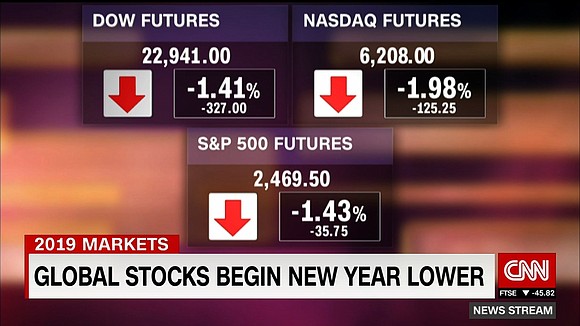Global stocks swing wildly as investors worry about China's economy
CNN/Stylemagazine.com Newswire | 1/2/2019, 11:31 a.m.
By Daniel Shane, CNN Business
(CNN) -- Global stock markets kicked off 2019 with another wild day of trading triggered by new signs of economic weakness in China.
Major stock indexes in Asia dropped sharply on Wednesday after new data suggested that China's vast manufacturing sector contracted in December.
Hong Kong's Hang Seng closed down 2.8%. The Shanghai Composite fell 1.2% and Australia's ASX dropped 1.6%. Japan's markets were closed for a public holiday.
European stocks opened sharply lower but mostly reversed course later. France's CAC ended down 0.8%, while the UK's FTSE and Germany's DAX closed with small gains.
The Dow fell as much as 399 points. But the market recovered from those early losses, and was flat by late morning in the United States.
The New Year volatility comes after a difficult 2018 for many investors. Last year was the worst for US stocks since 2008. December was a particularly dreadful month, with the Dow plunging 8.7%.
Chinese economy under pressure
Among the top concerns for investors is faltering growth in China, the world's second biggest economy, and continuing trade tensions with the United States. The Shanghai Composite slumped almost 25% last year, making it the world's worst-performing major market.
There were new signs of weakness in China on Wednesday.
The latest purchasing managers index survey, conducted by media group Caixin and research firm Markit, fell to 49.7 in December from 50.2 in November. It is this second time this week that data has indicated China's huge manufacturing sector is now contracting.
"It is looking increasingly likely that the Chinese economy may come under greater downward pressure," said Zhengsheng Zhong, director of macroeconomic analysis at research firm CEBM Group, in a statement accompanying the Caixin PMI release.
Analysts said that many investors were now betting on the prospect of a significant global economic slowdown within the next 18 months.
Other concerns include rising US interest rates and uncertainty surrounding the United Kingdom's scheduled exit from the European Union, said Kyle Rodda, a Melbourne-based analyst at broker IG Group.
"Any extra drag on a global economy already feeling the pinch... is highly unwelcomed," he said.




